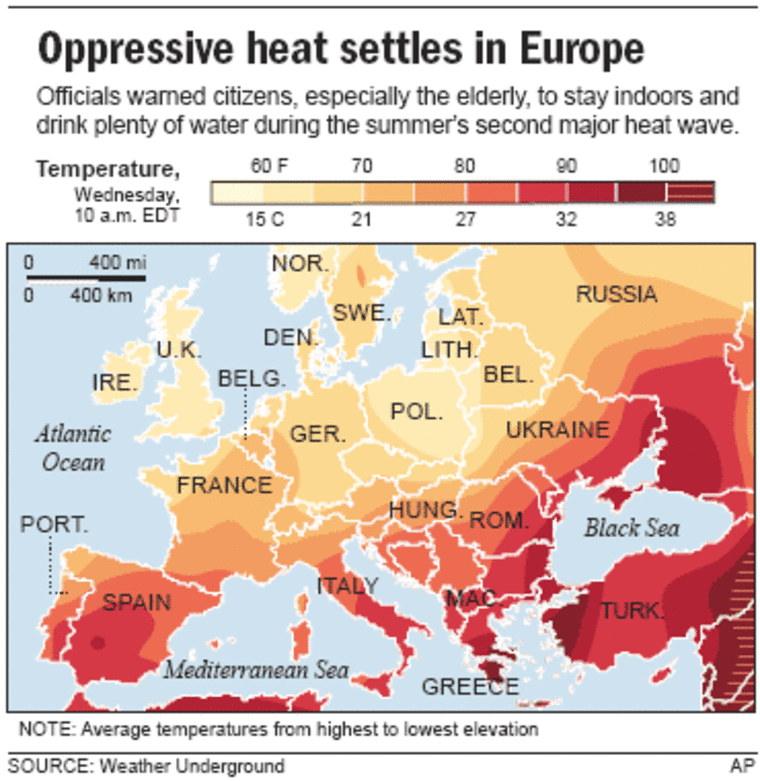Southern Europe sweltered under the summer’s second major heat wave Wednesday as firefighters battled blazes raging in Greece, Italy and Macedonia.
Officials blamed some fires on arson motivated by the desire to clear land for development.
The heat killed an 81-year-old woman in northern Greece, and a man died in a blaze that consumed homes outside the town of Aegio in the southern part of the country. Officials have attributed dozens of other deaths to the heat, including 33 in Romania.
The day’s high of 113 degrees outside Athens approached the 114.8 degrees reached in the region’s first major heat wave of the summer late last month. High pollution, humidity and stagnant air compounded the misery for residents and tourists in the capital.
Warned to stay home
Authorities warned citizens, especially the elderly, to minimize movement, stay indoors and drink plenty of water. Health officials in Hungary have said high temperatures may have contributed to the deaths of hundreds of seriously ill people.
Some 2,000 firefighters battled dozens of blazes in pine and oak forests in what Macedonia’s Crisis Management Center called one of the country’s worst fire seasons recorded.
One wind-blown fire raced across the border with Greece, where the Fire Service ordered 24-hour patrols in areas at risk. More than 1,000 additional firefighters were being hired to cope with fires around the country.
Stranded residents of Aegio were rescued by helicopter. In the western holiday island of Cephallonia, flames imperiled a nature reserve for native ponies. Tourists and a children’s camp were evacuated as a precaution in other parts of Greece.
Italian authorities said they had discovered incendiary devices at the site of one fire, giving credence to official suspicions that at least some blazes were set to destroy protected forests and create new construction areas.
A firefighting plane crashed in Italy on Monday, killing the pilot and seriously injuring the co-pilot in the area where the incendiary devices were found.
Italy passed a law in 2000 banning construction for 10 years in any burned area. But the rule is not always enforced, and forestry officials have recently closed two hotels — one in the north and one in the south — that were built over the ashes of forests ravaged by fires.
Builders culprits?
Builders are also seen as likely culprits in Greece — the only EU country that lacks a nationwide land registry which means fire-damaged forests have to be re-designated as protected areas.
Firefighters in Italy managed to subdue blazes in central and southern areas — many of them blamed on arson — after about 3,000 tourists and residents were evacuated Tuesday night.

Fires destroyed about 250 acres of forest in western Bulgaria, the Civil Defense Agency said Wednesday, with arson again suspected.
Albania suffered a new round of power and water cuts Wednesday, as hydroelectric power stations were unable to cope with increased demand. For more than a month Albanians have suffered power cuts of up to 15 hours at a stretch, while residents of Tirana, the capital, had access to water through the city’s mains for only two hours a day.
Late Tuesday, the western Balkans suffered widespread breakdowns in systems strained by high demand. Albania, Kosovo, Montenegro and Macedonia were all affected. Northern Greece suffered electricity cuts while many other areas were hit by the power company’s policy of rolling power cuts to stave off a widespread blackout.
Greek officials appealed to consumers to restrict peak-hour power use.
“We ask for citizens’ understanding,” Development Minister Dimitris Sioufas said. “Only with their cooperation we can cope with extreme weather conditions that have not appeared in our country for decades.”
Farmers in Romania estimate losses at over $2 billion. Many communities have been left without drinkable water as wells have dried up.
Meteorologists said cooler air was expected in the region by Thursday but no rain was forecast.